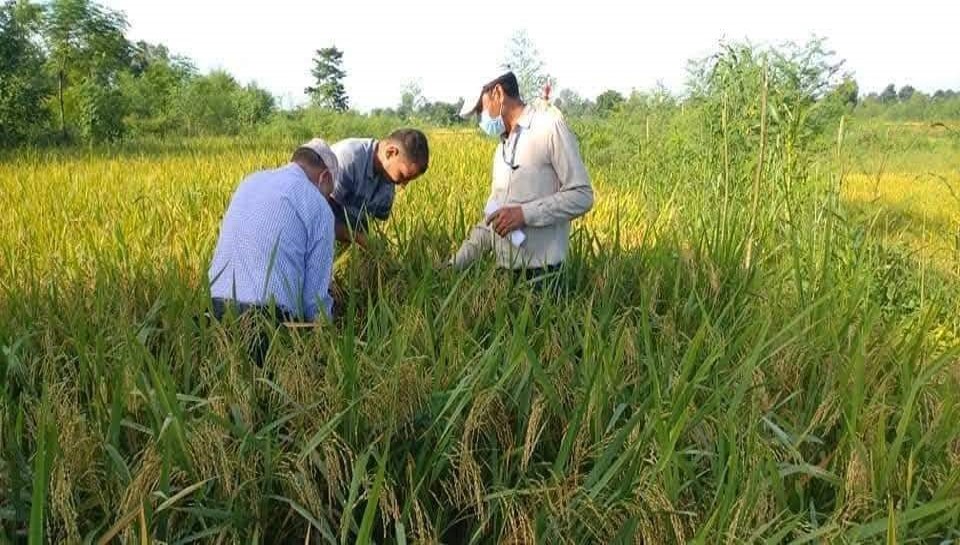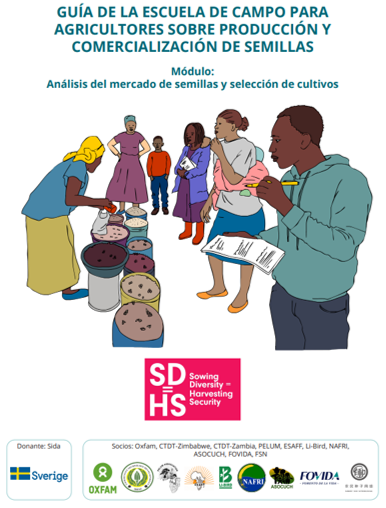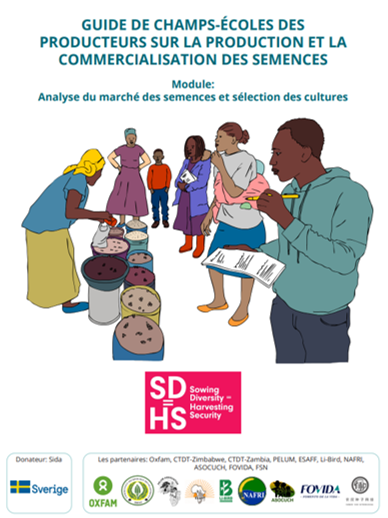Rajendra Dhakal
Good quality seeds can help farmers adapt to the impact of climate change and ultimately help achieve food and nutrition security. With this in mind, one of the main goals of the SD=HS project is that indigenous peoples and smallholder farmers enhance their livelihoods, income and seed security through the improved production and commercialization of seeds of crops and varieties adapted to farmers’ needs and preferences.
Since March 2020, the SD=HS project is working in Nepal with three smallholder farmers cooperatives to establish farmer seed enterprises (FSEs), with activities that are jointly implemented by Oxfam and LI-BIRD (Local Initiatives for Biodiversity, Research and Development). These FSEs are found in very different geographical locations, at altitudes ranging from 300 m to more than 3000 meters above sea level, and they are managed and owned by 1,600 smallholder farmer households. The three FSEs provide farmers with savings, credit, inputs, seedling and seed business services, and together they are marketing seeds of 39 varieties of 31 different crops. These positive results have greatly benefitted from different initiatives.
Trainings and capacity building
Among the different steps taken in 2020, the SD=HS project helped these FSEs strengthen their day-to-day operations with training courses and capacity building initiatives. Throughout the year, the project organized 6 face-to-face and 3 virtual training sessions on business planning, targeting board members and staff. The curriculum for was designed by the Oxfam team in Nepal and LI-BIRD, and it includes both an institutional and a financial analysis component. The first part focuses on the analysis of the internal and external environment, the selection of products and services, the operation and marketing planning processes, and the importance of growth strategies. The financial analysis lookes at how to complete balance sheets and income statements, at the importance of keeping complete records and calculating direct and indirect costs. The courses also considered the best ways to minimize the overhead and direct costs, or the way to expand market linkages, and we also added a section on key performance indicators.
A total of 30 participants (including 10 women) looked at how to develop a business strategy, choose the right crop portfolio, organize seed production farmers and groups, or set appropriate price mechanisms. In collaboration with their colleagues, all of them prepared 3-year business plans, all of which were revised after an assessment of the impact of COVID-19 (two of the cooperatives were visited physically and one virtually to collect the information). Participants also developed and started using a monthly reporting system with key performance indicators. And they also started using a weekly operations calendar, optimising the purchase and use of inputs (foundation seed, fertilizers and also capital). As Ganesh Bista, manager of the Jaibikbibhidhata FSE, said, ”the operational calendar makes our life easy. Now we know in advance when we need to have cash in FSE to purchase seed from farmers and when we need to approach Anomol and NARC for foundation seed”.
The project helped FSE managers and assistants join a virtual basic accounting training course, with content that was customized to their needs. Similarly, the project trained 12 FSE board members and staff on the financial management of seed enterprises, looking at the advantages of using accounting software like NECOS PLUS or others. This was a face-to-face session with participants coming from the three FSEs, in a way that provided cross-learning opportunities. At the same time, the session also looked at the impact of government policies and laws on the cooperatives and FSEs. This helped the Janawataoran FSE board, for example, decide to define themselves as a “multipurpose cooperative” (instead of as a “savings and credit cooperative”) so as to further develop their seed business. A next step was to organize a seed production course for the producers linked to each FSE. This included two events organized by Janawatoran on wheat, and one organized by Jaibibibhidhata on vegetables: both of them reached 53 seed producers.
Equipment and support
A second strategy has been to provide tools and equipment. For example, SD=HS helped a group of 25 seed producers acquire a radish threshing machine. This machine is easy to operate and reduces manual work by up to 70% – something that, as Mrs Khima Devi Pali stated, “has enormously eased our work”. According to several of the producers in the Doti district, “threshing has always been a responsibility of women and children, and we normally do it manually by beating a pack with a stick, something that takes us 2 to 3 days, depending upon harvest. Now we can do it within 2 to 3 hours with this machine. Also, seeds are not damaged, which is perhaps even more important…”
Along with this, the project provided 21 fertilizer sprayers to an equal number of farmers, promoting a more efficient use of fertilizers and also health safety, and also bought polyethylene plastic sheets for 61 producers, helping them dry the seeds that the FSE receives (and thus reducing their economic loss due to moisture and post-harvest damages). During 2020, the Janawataoran FSE was able to improve its storage and processing capacity, passing from 50 MT last year to up to 400 MT of seed today. Similarly, it can grade up to 0.3 MT of seed per hour. The FSE built a well-insulated storage house and purchased an improved high-capacity grading machine with the support of the provincial government. The storage house and grading machine is helping minimize damages and loss. (During 2019, 3.5 MT of wheat was damaged as a result of improper storage and packaging materials, but this was not reported anymore.) A general agreement was done with PMAMP so as to establish Jaibikbibhidhata FSE as a seed resource center. As part of the agreement, the project supported the FSE with another grading machine, whereas PMAMP will help build a modern storage house in 2021. This will help this FSE substantially increase its processing and storage capacity – with some staff members estimating that it will be 15 times better!
As part of these efforts, another step has been to provide 3 winnowing machines to the Jaibikbibhidhata FSE to help clean seeds and maintain their quality. The project helped this FSE improve its storage facilities and supported them with wooden floor rack, and improved packaging material. Jaibikbibhidata and Janawataoran FSE are now also using electronic equipment (computers, printers, internet), and remote support is possible. In the year 2020, the project team had connected FSE virtually 20 times and provided technical support. Digitizing FSEs have contributed to managing their account electronically. All FSEs are managing their business records electronically.
Last, and to increase the working capital of the FSEs, the project supported the Jaibikbibhidhata and Janawataoran FSEs with seed money to purchase seed and inputs. This was immediately acknowledged by the seed producers who were paid in cash for their product. Samapt Chaudhary admitted that “previously we had to wait for at least two months to get paid for our seed. Then, to manage our day-to-day expenses during these two months some time we had to take a loan, with a high interest rate. But now we have cash, there is no loan, and no interest. And this year the cooperative provided enough fertilizer, while before we never got an adequate amount. We farmers are very happy with our cooperative”.
Networking
A third strategy has been to help establish linkages and partnerships with private and governmental stakeholders. With SD=HS support, all FSE were able to coordinate activities with the Seed Quality Control Center and with the provincial seed testing laboratory, and conducted standing crop monitoring, seed testing, and certification even during the pandemic. During this period, 90% of FSEs seed passed inspection and testing.
The project helped the three FSEs to conduct 2 virtual and 3 physical networking and partnership meetings with private seed companies and other FSEs. The Jaibikbividhata FSE formally tied up for the first time with the Pabitra seed industries to supply improved seeds of local chili. Janawataoran joined hands with Manuwa seed enterprise to procure foundation seed of rice. Furthermore, FSEs has conducted 6 events of the consultative meeting with the local government and business relationship with rural municipality. During this period, the Janawataoran FSEs had sold a total of almost 10 MT of seed to the rural municipality.
The project also helped these three FSEs link to the provincial agriculture ministries, the District Agriculture Knowledge Resources Centers, and to the Prime Minister Agriculture Modernization Project (PMAMP). The Sudhurprachim provincial agriculture Ministry decided to support Janawataoran with a grading machine worth 8,000 euros; while PMAMP agreed to provide the necessary funds for the construction of a storage house (approximately 18,000 euros).
Positive results
Without a doubt, 2020 was a very difficult year, and COVID-19 has had a very serious impact in Nepal. But in spite of the many challenges, the project was able to help streghen these FSEs, and ensure that they remain fully functional, supporting the rural seed producers and farmers with their different activities. During the lockdown months and in spite of the restrictions, the different FSEs purchased all the seeds produced, providing a considerable source of income. Normally, seed producers earn an income which is 10-15% more than that of fresh vegetable and grain producers. The difference was even higher during COVID-19 as a result of the travel restrictions: while those normally buying vegetables and grains were not able to reach the different villages and collect these products, the FSEs had no difficulties. Operating from the same villages, the FSEs showed their commitment and purchased all the seeds produced locally.
Likewise, these three FSE have supported farmers with loans, foundation seeds, and fertilizers during these months, and farmers have found it easier to produce seeds for a whole year. In the case of grain and fresh vegetables, most farm-saved seeds were consumed by farmers during the lockdown months, so they had a shortage of seeds for production. During this time the FSEs have played a very important role in providing seeds on credit or loan. Their contribution to the resilient livelihoods of local seed producers and farmers has been significant. This is continuing during 2021, and we are confident that their impact will only grow.
Rajendra Dhakal works in the Oxfam office in Nepal, currently serving as the Technical Coordinator for the Sowing Diversity = Harvesting Security (SD=HS) project. He is a livelihoods expert and organic agriculture graduate, with six years of experience in managing livelihoods, food security and enterprise development projects with various national and international organizations. E-mail: RDhakal@oxfam.org.uk









